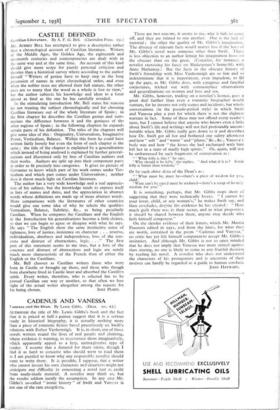CADENUS AND VANESSA
Vanessa and the Dean. By Lewis Gibbs. (Dent. los. 6d.)
ALTHOUGH the title of Mr. Lewis Gibbs's book and the fact that it is priced at half a guinea suggest that it is a serious study in historical biography, it is actually nothing more than a piece of romantic fiction based precariously on Swift's relations with Esther Vanhomrigh. It is, in short, one of those novels written round the lives of real people and claiming, where evidence is wanting, to reconstruct them imaginatively, which apparently appeal to a lazy, unimaginative type of reader. I assume that a demand for them exists, though I find it as hard to conceive who should want to read them as I am puzzled to know why any responsible novelist should want to write them. It is possible, I suppose, that a writer who cannot invent his own characters and situations might not anticipate any difficulty in concocting a novel just as easily from ready-made material. A novelist may think so, but the results seldom justify the assumption. In any case Mr. Gibbs's so-called " ironic history " of Swift and Vanessa is not one of the rare exceptions. There are two reasons, it seems to me, why it fails to come off, and they are related to one another. One is the lack of material ; the other the quality of Mr. Gibbs's imagination. The absence of relevant facts would matter less if the hero of Mr. Gibbs's novel were someone other than Swift. There is less objection to an author letting his imagination loose on the obscure than on the great. (Consider, for instance, a novelist exercising his fancy on Shakespeare's home-life with Anne Hathaway.) But the facts in the obscure history of Swift's friendship with Miss Vanhomrigh are so few and so indeterminate that it is impertinent, even impudent, to fill up the gaps, as Mr. Gibbs does, with egregious and fanciful conjectures, tricked out with commonplace observations and generalisations on women and love and sex.
Mr. Gibbs, however, trading on a novelist's licence, goes a great deal further than even a romantic biographer would venture, for he invents not only scenes and incidents, but whole conversations (in the pseudo-period style) in which Swift and Vanessa play a part for which there is not the slightest warrant in fact. Some of these may not offend every reader's taste, but I cannot believe that anyone who knows even a little about Swift's life and writings will not feel profoundly uncom- fortable when Mr. Gibbs really gets down to it and describes how Dr. Swift got all hot and bothered one sultry afterncon and how " soft " and " warm " and " pliant," &c., &c., body was and how " the kisses she had exchanged with him left her in a state of madly high spirits." Or, again, will not be embarrassed by such fragments of conversation as : " What folly is this ? ' he says. Why should it be folly,' she replies. ' And what if it is ? Some folly is better than wisdom.' " Or by such obiter dicta of the Dean's as :
" What must be, must be—there's a piece of wisdom for you, child.'
What can't be cured must be endured—there's a scrap of ho:nel wisdom for you.' "
It is something, perhaps, that Mr. Gibbs stops short of suggesting that they were technically lovers. " I cannot be your lover, child, or any woman's," he makes Swift say, and then concludes, despite the evidence he has created : " How much guilt there was in their secret, and in what proportion it should be shared between them, anyone may decide who feels himself competent."
On the slender evidence of their letters, which Mr. Martin Freeman edited in 1921, and from the hints, for what they are worth, contained in the poem " Cadenus and Vanessa," no critic has yet felt himself competent to accept Mr. Gibbs's invitation. And although Mr. Gibbs is not so open minded that he does not imply that Vanessa was more sinned against than sinning, no one is likely to come to any fruitful decision by reading his novel. A novelist who does not understand the characters of his protagonists and is uncertain of their motives can hardly be regarded as a guide to human conduct.
JOHN HAYWARD.






































 Previous page
Previous page